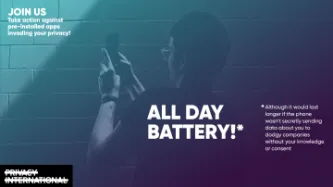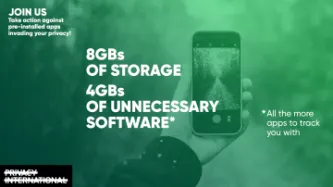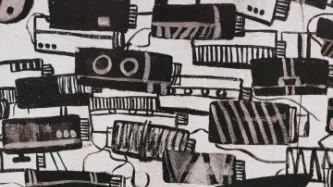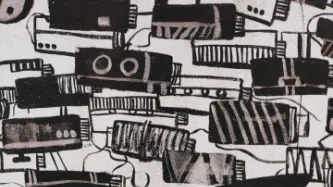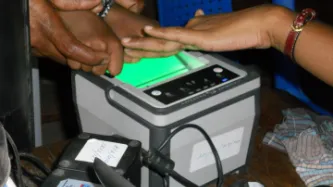Search
Content type: Examples
The Venezuelan government has ramped up quarantine enforcement in the Catia barrio in Caracas by issuing permits that allow only one family member out at a time and only before noon, and setting up 40 checkpoints. Many residents had flouted regulations in the barrio, home to 400,000 of Venezuela's poorest inhabitants; residents reported that many families had spent weeks without running water and without receiving government handouts of food.
https://in.reuters.com/article/us-health-coronavirus…
Content type: Long Read
This piece was written by Aayush Rathi and Ambika Tandon, who are policy officers at the Centre for Internet and Society (CIS) in India. The piece was originally published on the website Economic Policy Weekly India here.
In order to bring out certain conceptual and procedural problems with health monitoring in the Indian context, this article posits health monitoring as surveillance and not merely as a “data problem.” Casting a critical feminist lens, the historicity of surveillance practices…
Content type: News & Analysis
Today, the District Court of the Hague ruled that the right to privacy prevailed over the hunt against alleged benefits fraudsters. The ruling could have huge implications for the future of digital welfare around the world.
In NJCM cs/ De Staat der Nederlanden (NJCM vs the Netherlands), also known as the SyRI case, the court considered the legality of the System Risk Indication (SyRI), a system designed by the Dutch government to process large amounts of data collected by various Dutch public…
Content type: Advocacy
TEDIC, InternetLab, Derechos Digitales, la Fundación Karisma, Dejusticia, la Asociación por los Derechos Civiles y Privacy International acogen el llamado de la Relatoría Especial sobre Derechos Económicos, Sociales, Culturales y Ambientales (DESCA) de la Comisión Interamericana de Derechos Humanos (CIDH) de enviar información para la elaboración del Informe Anual sobre DESCA del año 2019, que se presentará ante la Organización de los Estados Americanos (OEA) en 2020.
El objeto de este…
Content type: Advocacy
TEDIC, InternetLab, Derechos Digitales, Fundación Karisma, Dejusticia, Asociación por los Derechos Civiles and Privacy International welcome the call made by the Special Rapporteurship on Economic, Social, Cultural and Environmental Rights (ESCER) of the Inter-American Commission on Human Rights (IACHR) to inform the preparation of the Annual Report of the ESCER for the year 2019, which will be presented to the Organization of American States (OAS) during 2020.
This submission aims to outline…
Content type: Video
Find out why 53 organisations from all over the world are telling Google it's time they take action on pre-installed apps (bloatware).
You can listen and subscribe to the podcast where ever you normally find your podcasts:
Spotify
Apple podcasts
Google podcasts
Castbox
Overcast
Pocket Casts
Peertube
Youtube
Music by Glass Boy, find more of their work here: glassboy.bandcamp.com/album/enjoy
(creativecommons.org/licenses/by-nd/3.0/)
Content type: News & Analysis
Privacy shouldn’t be a luxury.
Google claim to agree with us - we know that because Sundar Pichai, their CEO, said so this May in the New York Times. And yet, Google are enabling an ecosystem that exploits people who own low-cost phones.
Today we, along with over 50 organisations including Amnesty International, DuckDuckGo, and the ACLU are asking Google to step up, and we’re asking you to join us in pressuring them to do the right thing.
Sign the petition
Google has the power to…
Content type: Advocacy
Puede encontrar la carta a continuación. Agregue su voz a esta campaña firmando nuestra petición si cree que es hora de que Google deje de permitir la explotación.
Nota: Esta carta también está disponible en francés e inglés.
Estimado Sr. Pichai,
Nosotros, los firmantes, estamos de acuerdo con usted: la privacidad no puede ser un lujo reservado para las personas que tienen la capacidad de pagar por ella.
Sin embargo, los socios de Android Partner –que utilizan la marca y la imagen de…
Content type: Advocacy
You can find the letter below. Add your voice to this campaign by signing our petition if you believe that its time Google stopped enabling exploitation.
Note: This letter is also available in French and Spanish
Dear Mr. Pichai,
We, the undersigned, agree with you: privacy cannot be a luxury offered only to those people who can afford it.
And yet, Android Partners - who use the Android trademark and branding - are manufacturing devices that contain pre-installed apps that cannot be deleted…
Content type: Advocacy
Vous pouvez trouver la lettre ci-dessous. Ajoutez votre voix à cette campagne en signant notre pétition si vous pensez qu'il est temps que Google cesse d'activer l'exploitation.
Ce contenu est également disponible en anglais et en espagnol.
Cher M. Pichai,
Nous, les organisations signataires, sommes d’accord avec vous :
la vie privée n’est pas un luxe, offert seulement à ceux qui en ont les moyens.
Pourtant, les « Android Partners » – qui utilisent la marque déposée…
Content type: News & Analysis
CC: BY (Kirill Sharkovski)-SA
Este artículo fue escrito por Jamila Venturini, Coordinadora regional de Derechos Digitales. El artículo fue publicado por primera vez aquí. This article is available in English.
La implementación de programas que condicionan el acceso a servicios básicos por medio de vigilancia estatal y privada agudizan la inequidad imperante en el continente.
Mientras la brecha entre ricos y pobres se incrementa en el mundo, América Latina sigue siendo la región donde la…
Content type: News & Analysis
Picture: CC: BY (Kirill Sharkovski)-SA
This article was written by Jamila Venturini from Derechos Digitales. The original version (in Spanish) is available here.
How implementing social protection programmes that condition access to basic services to state and private surveillance exacerbate the prevailing inequality on the continent.
While the gap between rich and poor is increasing in the world, Latin America remains the most unequal region of the world. According to the Economic…
Content type: News & Analysis
Photo by Sharon McCutcheon on Unsplash
In May, the United Nations Special Rapporteur on extreme poverty and human rights, Philip Alston invited all interested governments, civil society organisations, academics, international organisations, activists, corporations and others, to provide written input for his thematic report on the human rights impacts, especially on those living in poverty, of the introduction of digital technologies in the implementation of national social protection…
Content type: Examples
After an 18-month investigation involving interviews with 160 life insurance companies, in January 2019 New York Financial Services, the state's top financial regulator, announced it would allow life insurers to use data from social media and other non-traditional sources to set premium rates for its customers. Insurers will be required to demonstrate that their use of the information doesn't unfairly discriminate against specific customers. New York is the first state to issue specific…
Content type: Examples
In February 2019, the World Food Programme, a United Nations aid agency, announced a five-year, $45 million partnership with the data analytics company Palantir. WFP, the world's largest humanitarian organisation focusing on hunger and food security, hoped that Palantir, better known for partnering with police and surveillance agencies, could help analyse large amounts of data to create new insights from the data WFP collects from the 90 million people in 80 countries to whom it distributes 3…
Content type: Advocacy
The United Nations Special Rapporteur on extreme poverty and human rights, Philip Alston, is preparing a thematic report to the UN General Assembly on the human rights impacts, especially on those living in poverty, of the introduction of digital technologies in the implementation of national social protection systems. The report will be presented to the General Assembly in New York in October 2019.
As part of this process, the Special Rapporteur invited all interested governments, civil…
Content type: Examples
For low-income Americans to receive public benefits they are legally entitled to, they must submit to widespread monitoring of their intimate and personal affairs. This monitoring includes sharing a trove of personal documents and information, unannounced home visits from caseworkers, mandatory face-to-face meetings with caseworkers to review one’s grocery, hygiene, and parenting choices, electronic and physical surveillance, mandatory drug testing, and investigations by fraud control agents…
Content type: Examples
The New York City public benefits system has been criticized for its punitive design, how it too often disciplines, rather than helps, people who are legally entitled to benefits. According to Mariana Chilton, the public benefits system is designed to control, surveil, and penalize low-income people, and it is women of colour who disproportionately bear these burdens. Chilton highlights how the violent treatment of Jazmine Headley and her baby in a public assistance waiting room in December…
Content type: Examples
Private companies are not the only actors pushing for increased control of benefit claimants. The World Bank has also instrumental in funding programmes aiming at assisting government in administrating welfare programmes which has led to futher surveillance of benefits claimants, in December 2016 for instance, they approved a $75 million budget to fund the so-called Social Safety Nets Project in Sri Lanka. The aim is to create a “single registry of citizens containing information on family…
Content type: Examples
The State is not always the only actor involved in the surveillance of benefits claimants. Often those practices are encouraged, facilitated or conducted by private companies. South Africa for instance mandated MasterCard to help distribute benefits through biometric debit cards.
https://www.finextra.com/newsarticle/23941/south-africa-enlists-mastercard-to-distribute-welfare-through-biometric-debit-cards
Publication: FinExtra
Content type: Examples
In Israel, the National Insurance Institutes sends out anti-fraud officers to spy on benefits claimants. Among the cases reported, a woman had her benefits allowances halved after a man entered her house pretending to be interested in buying the flat next door. The man, who was in fact a NII employee, discretely took picture of the woman to argue she was not actually severely disabled. The woman was eventually able to regain her full allowance.
The growing number of controversial cases of…
Content type: Examples
The DWP relies on anti-fraud officers who go and spy on benefit claimants to verify their claims. For instance, claimants who declare that they are a lone parent may end up with an officer trying to verify there is no one else living in the house. And once they are confident that the alleged lone parent is not actually single, their next step will be to find out if the other person is employed. In order to decide which household to target, the DWP relies on a “tip-off” system. People are in…
Content type: Examples
The surveillance of benefits claimants does not happen only online. In the UK, the Department of Work and Pensions (DWP) is known to be using CCTV footage of public buildings but also gyms and supermarkets to prove some benefits claimants are not actually disabled. Gym memberships are also being requested and an increasing number of private companies are being asked to send their footage for that reason.
https://www.theguardian.com/commentisfree/2018/may/31/benefits-claimants-fear-…
Content type: Examples
In Israel, the National Insurance Institute – in charge of granting benefits – eventually dropped a tender that had caused outrage in the country after being uncovered by Haaretz and Channel 13. The tender revealed the NII was trying to collect online data about benefits claimants – including from social media – to detect cases of frauds. The tender used wheelchair users as an example, suggesting that finding pictures of alleged wheelchair users using bikes on social media could contribute to…
Content type: Examples
The rise of social media has also been a game changer in the tracking of benefits claimants. In the UK in 2019, a woman was jailed after she was jailed for five months after pictures of her partying in Ibiza emerged on social media. She had previously sued the NHS for £2.5 million, after surviving a botched operation. She had argued the operation had left her disabled and the “shadow of a former self” but judges argued that the pictures suggested otherwise.
https://www.dailymail.co.uk/news/…
Content type: Examples
The rise of social media has also been a game changer in the tracking of benefits claimants. Back in 2009, the case of Nathalie Blanchard a woman in Quebec who had lost her disability insurance benefits for depression because she looked “too happy” on her Facebook pictures had made the news.
https://abcnews.go.com/Technology/AheadoftheCurve/woman-loses-insurance-benefits-facebook-pics/story?id=9154741
Author: Ki Mae Heussner
Publication: ABC News
Content type: Examples
In London, four boroughs have been trialling the London Counter Fraud Hub. The hub is designed to process huge quantities of data from millions of household to detect certain types of fraud involving the single person council tax discount (in London, a person living alone gets a reduced rate on their council tax), the subletting of local authority housing and the business relief and rating. With a 20% error rate, it means thousands of households will receive letters wrongly suspecting them of…
Content type: Examples
In Mexico, people registered as beneficiaries of any programmes led by the Ministry of Social Development could obtain a TV set, as part of the transition from analogue to digital TV organised by the Ministry of Communications and Transportation. Yet, the Ministry of Communications and Transportation requested the collection of fingerprints, the scanning of the beneficiary’s voter card and the beneficiary’s address in exchange of the TV set. The company Codigo Empresarial SA de CV was tasked…
Content type: Examples
In Ireland benefits claimants are expected to register for a Public Services Card (PSC) in order to access benefits. PSC users are expected to have their photographs taken in department offices, which is then digitally captured along with their signature. While this card was originally created to prevent benefits fraud – by insuring someone could not register twice to claim benefits – it is increasingly being used as a de facto form of ID and citizens have been apply for PSC even when they do…
Content type: Examples
Cases of people being denied healthcare as they fail to provide an Aadhaar number have already started emerging. A 28-year old domestic worker, for instance, had to be hospitalised for a blood transfusion after she had an abortion with an unqualified local physician. She had been denied an abortion, to which she was legally entitled, from a reputable government hospital, as she did not have an Aadhaar card. Following this case, 52 public health organisations and individuals issued a statement…





